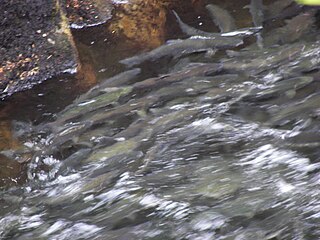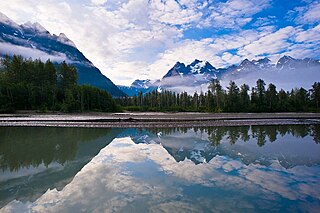
Cordova is a city in Chugach Census Area, Alaska, United States. It lies near the mouth of the Copper River, at the head of Orca Inlet on the east side of Prince William Sound. The population was 2,609 at the 2020 census, up from 2,239 in 2010.

The European Patent Office (EPO) is one of the two organs of the European Patent Organisation (EPOrg), the other being the Administrative Council. The EPO acts as executive body for the organisation while the Administrative Council acts as its supervisory body as well as, to a limited extent, its legislative body. The actual legislative power to revise the European Patent Convention lies with the Contracting States themselves when meeting at a Conference of the Contracting States.

Eyak was a Na-Dené language, historically spoken by the Eyak people, indigenous to south-central Alaska, near the mouth of the Copper River. The name Eyak comes from a Chugach Sugpiaq name (Igya'aq) for an Eyak village at the mouth of the Eyak River.
The National Fish Hatchery System (NFHS) was established by the U.S. Congress in 1871 through the creation of a U.S. Commissioner for Fish and Fisheries. This system of fish hatcheries is now administered by the Fisheries Program of the U.S. Fish and Wildlife Service (Service), an agency within the United States Department of the Interior.

The Eyak are Native American Indigenous peoples historically located on the Copper River Delta and near the town of Cordova, Alaska. Today, Eyak people live in Cordova, Yakutat, across Alaska, and the U.S. Many of them do not qualify to be tribal members in the Native Village of Eyak, a federally recognized Alaska Native tribe which was established through the Alaska Native Claims Settlement Act in 1971. This is due to the enrollment qualifications that extend tribal membership only to those who reside in the town of Cordova for the majority of the year.

The Copper River or Ahtna River, Ahtna Athabascan ‘Atna’tuu, "river of the Ahtnas", Tlingit Eeḵhéeni, "river of copper", is a 290-mile (470 km) river in south-central Alaska in the United States. It drains a large region of the Wrangell Mountains and Chugach Mountains into the Gulf of Alaska. It is known for its extensive delta ecosystem, as well as for its prolific runs of wild salmon, which are among the most highly prized stocks in the world. The river is the tenth largest in the United States, as ranked by average discharge volume at its mouth.

The Evangelical Presbyterian Church (EPC) is an American church body holding to presbyterian governance and Reformed theology. It is most distinctive for its approach to the way it balances certain liberties across congregations on "non-essential" doctrines, such as egalitarianism in marriage or the ordination of women, alongside an affirmation of core "essential" doctrinal standards.

The Atlantic salmon is a species of ray-finned fish in the family Salmonidae. It is the third largest of the Salmonidae, behind Siberian taimen and Pacific Chinook salmon, growing up to a meter in length. Atlantic salmon are found in the northern Atlantic Ocean and in rivers that flow into it. Most populations are anadromous, hatching in streams and rivers but moving out to sea as they grow where they mature, after which the adults seasonally move upstream again to spawn.

The Marine Stewardship Council (MSC) is a non-profit organization which aims to set standards for sustainable fishing. Fisheries that wish to demonstrate they are well-managed and sustainable compared to the MSC's standards are assessed by a team of Conformity Assessment Bodies (CABs).

The Taku River is a river running from British Columbia, Canada, to the northwestern coast of North America, at Juneau, Alaska. The river basin spreads across 27,500 square kilometres (10,600 sq mi). The Taku is a very productive salmon river and its drainage basin is primarily wilderness.

Oncorhynchus is a genus of fish in the family Salmonidae; it contains the Pacific salmon and Pacific trout. The name of the genus is derived from the Greek ὄγκος + ῥύγχος, in reference to the hooked snout that the males develop during mating season.

BirdLife International is a global partnership of non-governmental organizations that strives to conserve birds and their habitats. BirdLife International's priorities include preventing extinction of bird species, identifying and safeguarding important sites for birds, maintaining and restoring key bird habitats, and empowering conservationists worldwide.

The Wilderness Society is an American non-profit land conservation organization that is dedicated to protecting natural areas and federal public lands in the United States. They advocate for the designation of federal wilderness areas and other protective designations, such as for national monuments. They support balanced uses of public lands, and advocate for federal politicians to enact various land conservation and balanced land use proposals. The Wilderness Society also engages in a number of ancillary activities, including education and outreach, and hosts one of the most valuable collections of Ansel Adams photographs at their headquarters in Washington, D.C.
Turtle Island Restoration Network (TIRN) is a United States 501(c)(3) non-profit organization founded in 1999 whose mission is "To take swift and decisive action to protect and restore marine species and their habitats and to inspire people in communities all over the world to join us as acmarine species advocates."
SPAWN, the Salmon Protection and Watershed Network, is a project of the Turtle Island Restoration Network (TIRN), a United States 501(c)(3) nonprofit environmental organization.

Fauntleroy Park is a 32.9-acre (13.3 ha) park in the Fauntleroy neighborhood of Seattle, Washington. Fauntleroy Creek begins here. Nearby Lincoln Park was called Fauntleroy Park until 1922.

The survival of wild salmon relies heavily on them having suitable habitat for spawning and rearing of their young. This habitat is the main concern for conservationists. Salmon habitat can be degraded by many different factors including land development, timber harvest, or resource extraction. These threats bring about the traditional methods of protecting the salmon, but a new movement aims to protect the habitats before they require intervention.

Rivers Without Borders is a nonprofit organization fiscally sponsored by the Tides Center in the United States. Rivers Without Borders works as a project of Tides Canada Initiatives in Canada. Tides Canada's mission is to provide uncommon solutions for the common good by leading and supporting actions that foster a healthy environment and just Canadian society.

The European Political Community (EPC) is an intergovernmental forum for political and strategic discussions about the future of Europe, established in 2022 after the Russian invasion of Ukraine. The group first met in October 2022 in Prague, with participants from 44 European countries, as well as the Presidents of the European Council and the European Commission.














